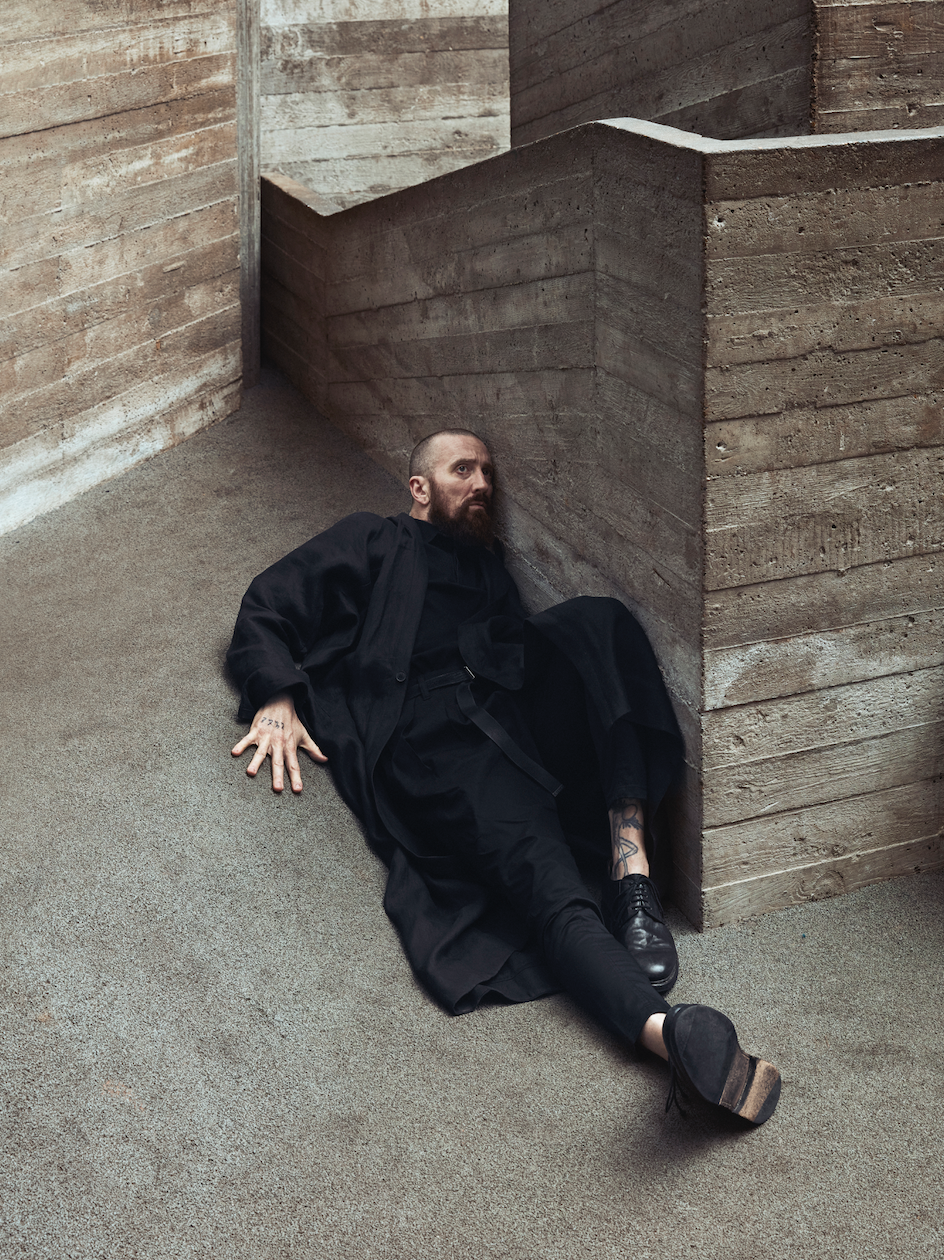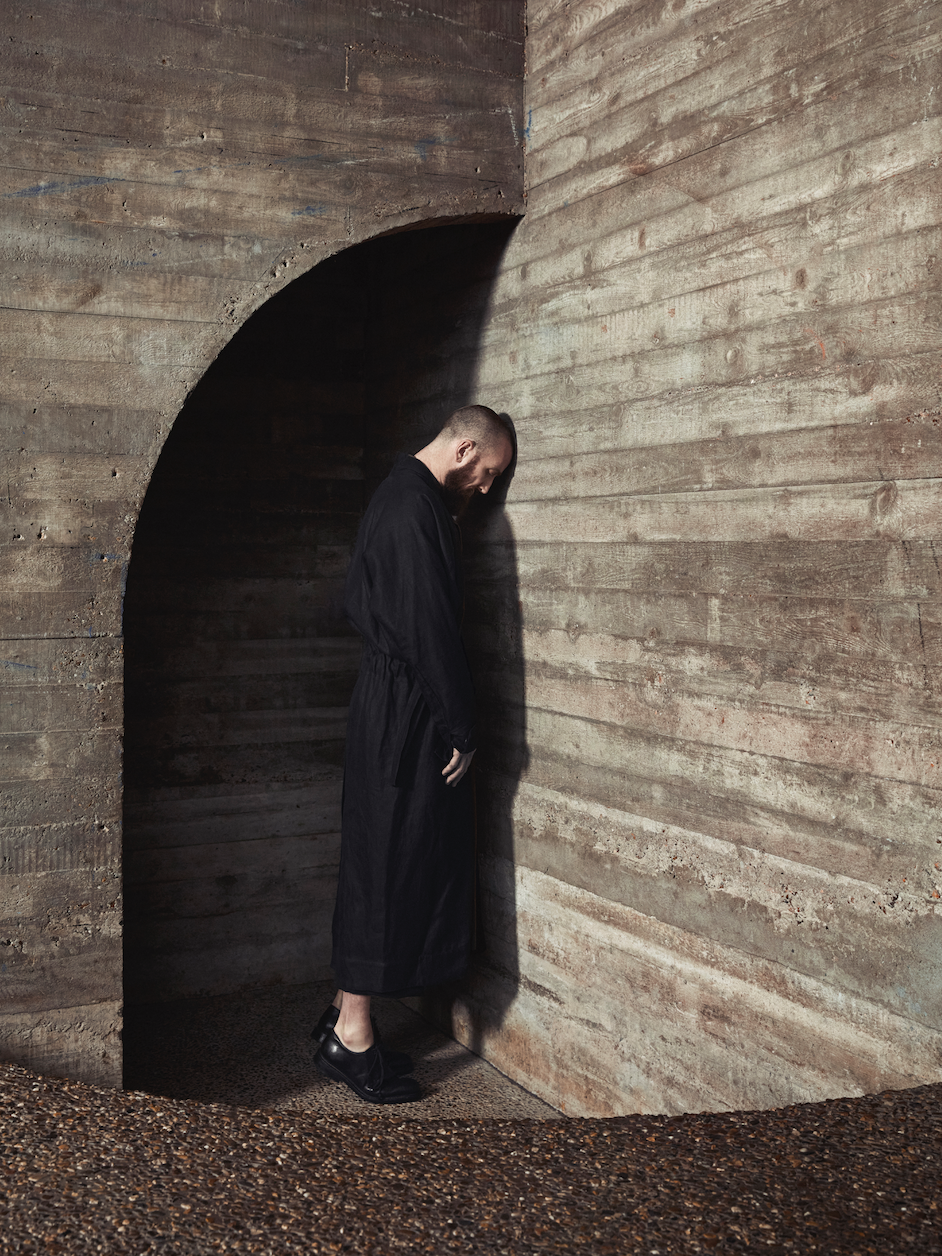No sound without silence
Colin H. van Eeckhout / CHVE
An intriguing man with a calm demeanour, hiding a maze of thoughts behind his grey eyes, Colin H. van Eeckhout is the frontman of the band Amenra. Initiator of many collaborative projects that cross the boundaries between music and art, van Eeckhout explores his personal experiences under the name of CHVE. While participating in the underground scene, his universal language of emotion and authenticity harnesses wide appeal.
Words: Jessy Van Durme
Photography: Piet Albert Goethals
Many people associate the music you make with noise, volume and loudness, but actually silence plays an important role.
Silence is an essential part of our music. In every band we play in, we seek to use silence to its maximum effect. Comparable to the calm before the storm, when you go ‘small’ within the music, the mass of sound afterwards becomes twice as intense. You know it is coming, but you don’t know when. It’s all about contrast, or dualism even, and the two elements have a clear impact on people.
Silence is a place where we don’t feel comfortable; it makes us vulnerable. You could say silence is the most ‘bare’ state of being. You become aware of every tiny detail, every breath or movement. As for the volume of sound, it takes up space; we can hide behind it, physically or even literally behind the instrument itself.
There are five members of Amenra, how do you work together to build the tension before tearing it down?
We started playing as teenagers, so we grew and evolved together. Now we understand each other thoroughly, so we feel the same tension and understand the value of silence in relation to what we create. We analyse every note and sound in order to purify the essence of what we want to say, so nothing is superfluous.
You could say silence is the most ‘bare’ state of being. You become aware of every tiny detail, every breath or movement.
Being vulnerable isn’t often associated with your music genre, which has its roots in Doom/Sludge metal, Hardcore punk and Post-rock. It often focuses on the exterior world and social critique.
Particularly in Hardcore punk, I felt the broader spectrum of emotion was missing. I wanted to pull the music closer to our hearts. As tough as people of that scene portray themselves, everyone is brought to their knees at some point in life. That’s exactly what I wanted to talk about, that and the slow journey out of our depth. We felt we could bring personal experience to the genre, because such a wide spectrum of emotions can be expressed by music and sound in general.
Of course you have the ‘aggression’ which is more common, but we also try to give fragility a place. Because that is what makes us human. We all have both sides to our inner self. We focus on introspection for both the spectator, as well as for ourselves – expressing the feeling of the need to scream, or on the other hand, to feel broken. This is the magic of what we do – we give shape to these emotions. I think that’s why we are honored with such a diverse audience.
Although the content is often based on personal experience, we want to translate this in a more abstract way into a collective feeling of loss. I write the words, but I frequently try to empathise with those around me. The song ‘A Solitary Reign’ [from the album Mass VI (2017)] was written while our drummer was coping with the loss of his mother – though it was significant to us all, because we all shared particularly close relationships with our mothers. It explores how the mothers of our generation had this silent domination in the family, holding everything together and raising us. For me it’s important to relate to people who have the need to put loss or struggle into words. I try to be their voice through the universal language of music.
Has this always been your style of creating?
When we started playing at 15 or 16 years old, I was interested in the image and ‘acting tough’, but at the age of 20 I was confronted for the first time with a great loss when my father passed away. I didn’t have brothers to share my grief with and felt quite lonely. I had to find a way to handle what I was going through. Around that time at a gig, I started hitting the stage monitors, and I realised I was releasing all my anger against the cancer and the death of my father.
There, on that stage, it was not just me who realised we had found something very pure and powerful. The other band members and audience felt the same intensity and authenticity of that moment. The music suddenly became necessary. It was not an ‘act’ anymore, the image fell away, and became something real. From that day, we started to trust our gut and draw inspiration from our own realities. Every note had to hold value, or not be there at all.
How did your personal project ‘CHVE’ materialize during this?
After years of being the ‘singer’ of the band, I wanted to explore what kind of music I could create personally. It started with the guitar and then a hurdy-gurdy. I think a solo project is the most direct projection that one can achieve. There’s no dialogue, which makes it slightly more scary. Making music on my own allows me to move faster and cut closer. Most of my creations come out of solitude, so it felt natural to occasionally work alone, although it makes me feel very insecure.
From the outside, people might think you all are very wretched souls, but you seem to have quite a bright personality?
I am indeed quite a happy person. I have everything in my life to be happy for, but some people have this tristesse in their nature – a trait we all share in the band. When we’re on tour we have so much fun, but when it comes to the music it is serious. For us, our music could be compared to a weekly therapy session, where you talk about your problems and feel relieved for the rest of the week. About an hour before we go on stage, the morale gets lower until the very last chord is played.





